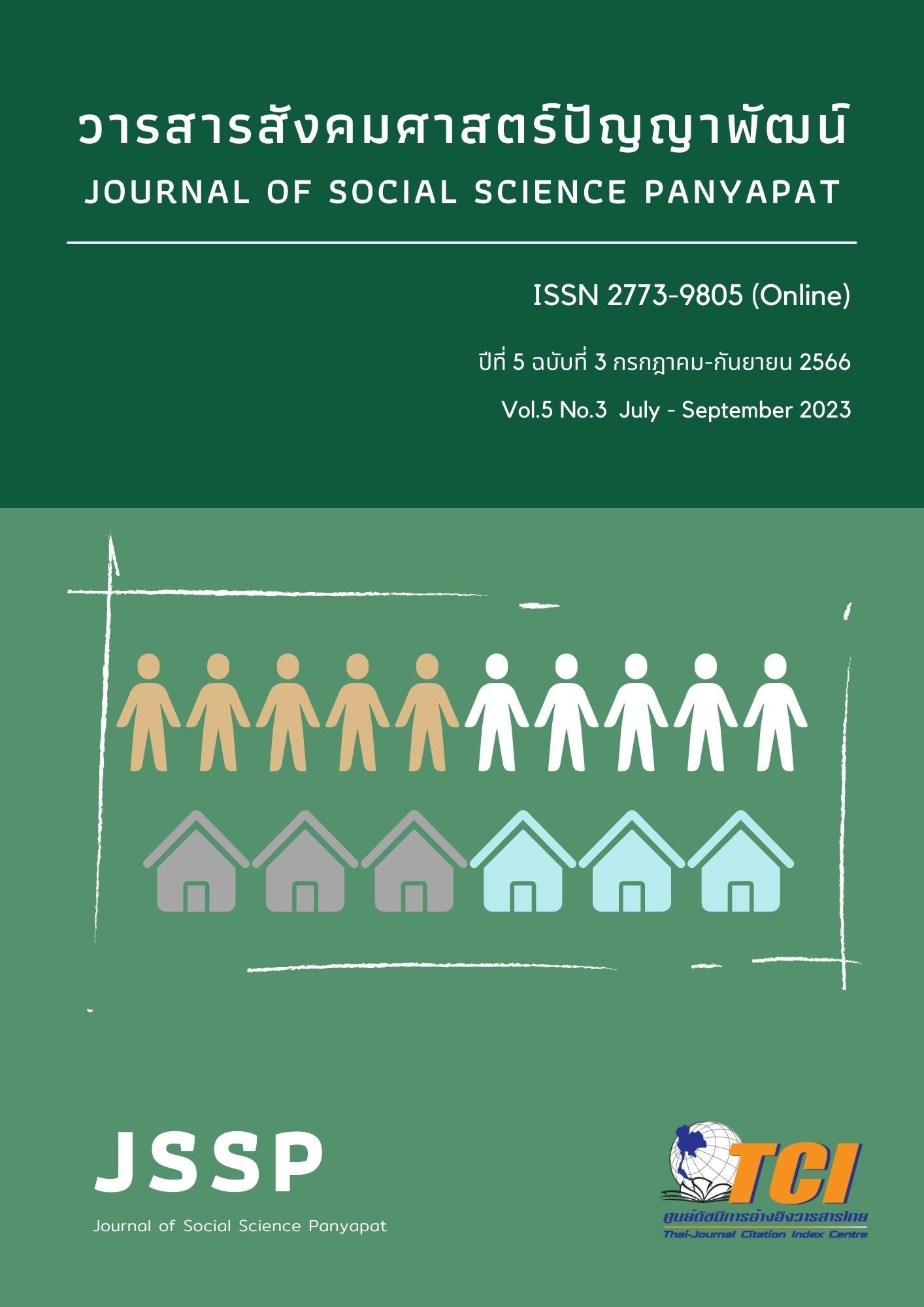The Influence of Perceived in Organizational Culture, Quality of Work Life and Trust in Supervisors on the Job Performance of Operational Staff at the Electronics Industry of Pinthong Industrial Estate Chon Buri Province
Keywords:
Perceived in Organizational Culture, Quality of Work Life, Trust in Supervisors, Job PerformanceAbstract
This research article aimed (1) to study the influence of perceived in organizational culture on quality of working life; (2) to study the influence of perceived in organizational culture on trust in supervisors; (3) to study the influence of quality of work life on the job performance; (4) to study the influence of trust in supervisors on the job performance; and (5) to study the influence of perceived in organizational culture on the job performance, the sample was 305 operational staff at the electronics industry of Pinthong Industrial Estate Chon Buri Province. They were selected by Probability Sampling the instrument for collecting data was questionnaire Analysis data by Multiple Regression Analysis. The result of the study found that Perceived in organizational culture parts of Humanistic-Encouraging, Achievement and Affiliate had positive influence on quality of work life. Perceived in organizational culture parts of Affiliate had positive influence on trust in supervisors. Quality of work life parts of Future Opportunity for Continued Growth and Security, Social Integration in the Work Organization, Work and the Total Life Space, Safe and Healthy Working Conditions had positive influence on the job performance, while Immediate Opportunity to Use and Develop Human Capacities and Adequate and Fair Compensation had negative influence on the job performance. Trust in supervisor parts of Reliability had positive influence on the job performance. Perceived in organizational culture parts of Achievement, Affiliate and Self-Actualizing had positive influence on the job performance. The results of 5studies as above have a statistical significance level of 0.05.
References
กรมโรงงานอุตสาหกรรม. (2562). ข้อมูลโรงงาน. สืบค้น 9 เมษายน 2563. จาก https://www.diw.go.th/webdiw/s-data-fac.
ธนัญฉัตร เอี่ยมเพ็ชร์. (2562). ความสัมพันธ์ระหว่างวัฒนธรรมองค์การแรงจูงใจในการปฏิบัติงานกับคุณภาพชีวิตการทำงานของบุคลากรคณะมนุษยศาสตร์และสังคมศาสตร์ มหาวิทยาลัยบูรพา. วารสารวิชาการมนุษยศาสตร์และสังคมศาสตร์มหาวิทยาลัยบูรพา, 27(54), 320-342.
ปริมใจ โพธิ์รักษา และ ทิพทินนา สมุทรานนท์. (2561). ความไว้วางใจในหัวหน้างาน ความยึดมั่นผูกพันในงานพฤติกรรมการเป็นสมาชิกที่ดีขององค์การและผลการปฏิบัติงาน ของพยาบาลวิชาชีพในโรงพยาบาลเอกชน. วารสารสังคมศาสตร์และมนุษยศาสตร์, 44(2), 249-273.
มณฑิกานต์ สุขขวัญและคณะ. (2560). อิทธิพลของการรับรู้วัฒนธรรมองค์การ ความพึงพอใจในการทำงานความผูกพันกับองค์การ ที่มีผลต่อผลการปฏิบัติงานของพนักงาน: กรณีศึกษาโรงแรมในจังหวัดภูเก็ต. วารสารดุษฎีบัณฑิตทางสังคมศาสตร์, 7(3), 109-121.
ศิริชัย ศรีประทุมวงศ์. (2554). ภาวะผู้นำ พฤติกรรมการเป็นสมาชิกที่ดีขององค์การ องค์การแห่งการเรียนรู้ ความไว้วางใจในหัวหน้างาน และผลการปฏิบัติงาน ของพนักงานระดับปฏิบัติการในโรงงานอุตสาหกรรมอิเล็กทรอนิกส์. (วิทยาศาสตรมหาบัณฑิต, มหาวิทยาลัยเกษตรศาสตร์).
สถาบันไฟฟ้าและอิเล็กทรอนิกส์ (สฟอ.). (2563). ศูนย์ข้อมูลเชิงลึกอุตสาหกรรมไฟฟ้าและอิเล็กทรอนิกส์. สืบค้น 21 มิถุนายน 2563. จาก https://www.thaieei.com.
สราวรรณ์ เรืองกัลป์ปวงศ์, สมเดช รุ่งศรีสวัสดิ์, บัณฑิต ผังนิรันดร์ และ เกษมสันต์ พิพัฒน์ศิริศักดิ์. (2559). อิทธิพลของวัฒนธรรมขององค์การ รูปแบบการตัดสินใจ ความไว้วางใจและการถ่ายโอนความรู้ที่มีต่อการปฏิบัติงานของพนักงานระดับปฏิบัติการธนาคารพาณิชย์ไทย. สุทธิปริทัศน์, 30(พิเศษ), 292-305.
สำนักงานเศรษฐกิจอุตสาหกรรม (สศอ.). (2563). รายงานภาวะเศรษฐกิจอุตสาหกรรม. สืบค้น 21 มิถุนายน 2563. จาก https://www.oie.go.th.
สิรินันท์ เกษมธาดาศักดิ์ และ วิโรจน์ เจษฎาลักษณ์. (2560). อิทธิพลของคุณภาพชีวิตในการทำงานที่มีผลต่อการปฏิบัติงานตามบทบาทหน้าที่ผ่านความผูกพันต่อองค์กรด้านจิตใจของพนักงานบริษัท ส. ขอนแก่นฟู้ดส์ จำกัด (มหาชน) อำเภอบางพลี จังหวัดสมุทรปราการ. วารสารบริหารธุรกิจศรีนครินทรวิโรฒ, 8(2), 65-80.
สุทธนา สุนทรสถิตย์. (2556). ความสัมพันธ์ระหว่างรูปแบบภาวะผู้นำ วัฒนธรรมองค์การ ความไว้วางใจในผู้บังคับบัญชา และความไว้วางใจในองค์การของบุคลากรเทศบาลนครนครปฐม. (รัฐประศาสนศาสตรมหาบัณฑิต, มหาวิทยาลัยศิลปากร).
อัครกิติต์ พัฒนสัมพันธ์. (2560). วัฒนธรรมองค์การที่มีผลต่อคุณภาพชีวิตการทำงานเพื่อเพิ่มประสิทธิภาพในการปฏิบัติงานของพนักงานในกลุ่มบริษัทญี่ปุ่นในจังหวัดปราจีนบุรี. วารสารรังสิตบัณฑิตศึกษาในกลุ่มธุรกิจและสังคมศาสตร์, 2(2), 75-89.
Anwar, M., Chandrarin, G., Darsono, J. T., & Respati, H. (2017). Lecturer job performance study: Motivation, emotional intelligence, organizational culture and transformational leadership as antecedents with job satisfaction as an intervening. IOSR Journal of Business and Management, 19(6), 1-9.
Cooke, R. A., & Lafferty, J. C. (1989). Organizational culture inventory. Plymouth, MI: Human Synergistics.
Fitria, H. (2018). The Influence of Organizational Culture and Trust Through the Teacher Performance In ThePrivate Secondary School in Palembang. International Journal of Scientific & Technology Research, 7(7), 82-86.
Goodman, S. A., & Svyantek, D. J. (1999). Person–organization fit and contextual performance: Do shared values matter. Journal of vocational behavior, 55(2), 254-275.
Hamidi, Y., Mohammadi, A., Soltanian, A. R., & Mohammad Fam, I. (2016). Organizational culture and its relation with quality of work life in university staff. Iranian Journal of Ergonomics, 3(4), 30-38.
Juarsah, M. A., & Masdupi, E. (2019, September). Effect of Organizational Justice, Trust in Bosses and Job Satisfaction on Employee Performance at PT. PLN (Persero) Main Unit of West Sumatra Region. In Third Padang International Conference On Economics Education, Economics, Business and Management, Accounting and Entrepreneurship (PICEEBA 2019) (pp. 352-363). Atlantis Press.
Kawiana, I. G. P., Dewi, L. K. C., Martini, L. K. B., & Suardana, I. B. R. (2018). The influence of organizational culture, employee satisfaction, personality, and organizational commitment towards employee performance. International research journal of management, IT and social sciences, 5(3), 35-45.
Krejcie, R. V. & Morgan, D. W. (1970). Determining Sample Size for Research Activities. Educational and Psychological Measurement, 30, 607-610.
Mishra, A.K. (1996). Organizational responses to crisis: The centrality of trust. In R.M. Kramer and T. Tyler. (eds.) Trust in Organizations. California: Sage Publications
Nir, A.-S. (2012). Inter-organizational culture, trust, knowledge sharing, collaboration and performance in supply chain of maritime industries: Examining the linkages. African Journal of Business Management, 6(19), 5927-5938.
Parven, A. & Awan, A. G. (2018). Effect of organizational justice, job satisfaction and trust on managers on employee performance. Global Journal of Management, Social Sciences and Humanities, 4(2), 259-279.
Putra, I. N. T. D., Ardika, I. W., Antara, M., Idrus, S., & Hulfa, I. (2021). The Effects of Quality of Work Life on Job Performance, Work Motivation, Work Ethics, Job Satisfaction, and Self-efficacy of Hotel Employees in Lombok. Asia-Pacific Journal of Innovation in Hospitality and Tourism, 10(3), 19-37.
Rai, R. (2015). Does Quality of Work Life Have Effect on Job Performance?-A Study on Indian IT Professionals. SAMVAD, 10, 93-99.
Walton, R. E. (1973). Quality of working life: what is it. Sloan management review, 15(1), 11-21.
Downloads
Published
How to Cite
Issue
Section
License
Copyright (c) 2023 Journal of Social Science Panyapat

This work is licensed under a Creative Commons Attribution-NonCommercial-NoDerivatives 4.0 International License.


